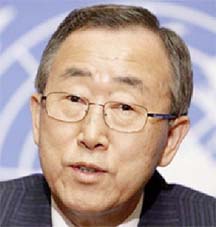United Nations Secretary General Ban Ki Moon spends most of his time talking about the Middle East, Ukraine and global warming. So when I interviewed him last week, I wanted to hear his views on the political crisis in Venezuela and other issues in Latin America.

The Venezuelan regime’s violent repression of student protests earlier this year left 42 dead, 874 wounded and 3,306 arrested, according to official figures. But the issue has virtually disappeared from the headlines in recent months.
Has Venezuelan President Nicolás Maduro heeded your request in March that he “listen carefully” to the demands of student protesters, and that he engage in a meaningful dialogue with the opposition? I asked the UN chief.
Ban responded that mediation talks supervised by South America’s Unasur regional organization and the Vatican “should provide a good momentum” to solve Venezuela’s political crisis, but suggested that the Venezuelan government has not done enough to help the negotiations succeed.
“What is most important is that President Maduro should reach out to all the different groups of people who may have different positions, and embrace [the dialogue] in an harmonious and inclusive way,” the UN chief said in the interview, which is to air in full on CNN en Español today.
Unasur, with the Vatican’s support, started supervising a dialogue between the Venezuelan government and the opposition on April 10, after the student protests that shook Venezuela earlier in the year.
But Unasur — a diplomatic group launched by Brazil and Venezuela in a little-disguised effort to keep the United States and Mexico out of regional issues — has long acted as a diplomatic support mechanism for the Maduro government, critics say. Unasur has pretty much retreated from the scene once the Venezuelan regime quashed the street protests, they say.
There has not been any serious effort by Unasur foreign ministers to restart the dialogue between the Venezuelan government and the opposition in recent months, according to Venezuelan opposition sources.
A 103-page report issued by the Human Rights Watch monitoring group in May concluded that there had been “an alarming pattern” of human rights abuses during the repression of the student protests, including shootings at point blank range and torture by Venezuelan government forces. There were at least 10 documented cases of torture by security forces, the report said.
Curious about the UN chief’s remark about an alleged “good momentum” provided by the Unasur/Vatican mediation effort, I noted to Ban that Unasur’s mediation effort has for all practical purposes been suspended.
Ban responded that he is still hopeful about the mediation talks. He added, “I again encourage the leaders in the region, particularly Unasur, to discuss this matter and try to help resolve this situation.”
Next, I asked Ban why the United Nations Human Rights Council hasn’t made any serious effort to look into Venezuela’s rights abuses, and has kept largely silent on the issue. He responded that the Human Rights Council “has taken up discussion on this matter.”
Isn’t the UN Human Rights Council’s silence on Venezuela due to the fact that some of the Council’s leading members include Cuba, China and other dictatorships that are close to the Maduro government? I asked.
“I would not like to make any specific comments on specific issues, like the Venezuelan case, but, overall, the Human Rights Council has been very important and has had a crucial role in addressing human rights violation issues” around the world, Ban responded.
He added, “We have high appreciation and admiration for what the Human Rights Council has been doing. Now, it is important that whenever and wherever [human rights violation] cases may happen, including the case of Venezuela, the Human Rights Council should take correct measures.”
My opinion: I have high appreciation for Ban’s call on Venezuela’s president to “reach out” to the opposition, instead of — what follows are my words — imprisoning political opponents and torturing student protesters.
But, regarding the UN Human Rights Council, it is a joke. More than an international monitoring group for human rights abuses, its members, including Cuba, China, Russia, Vietnam, and Venezuela, have created a mutual protection society to keep themselves from being investigated for their respective rights violations.
Ban’s call on the Venezuelan government and Unasur to resume talks with the opposition should be applauded. On the other hand, Unasur and the UN Human Rights Council’s silence on Venezuela’s bloody repression of student protests is nothing but scandalous.
© The Miami Herald, 2014. Distributed by Tribune Media Services.
